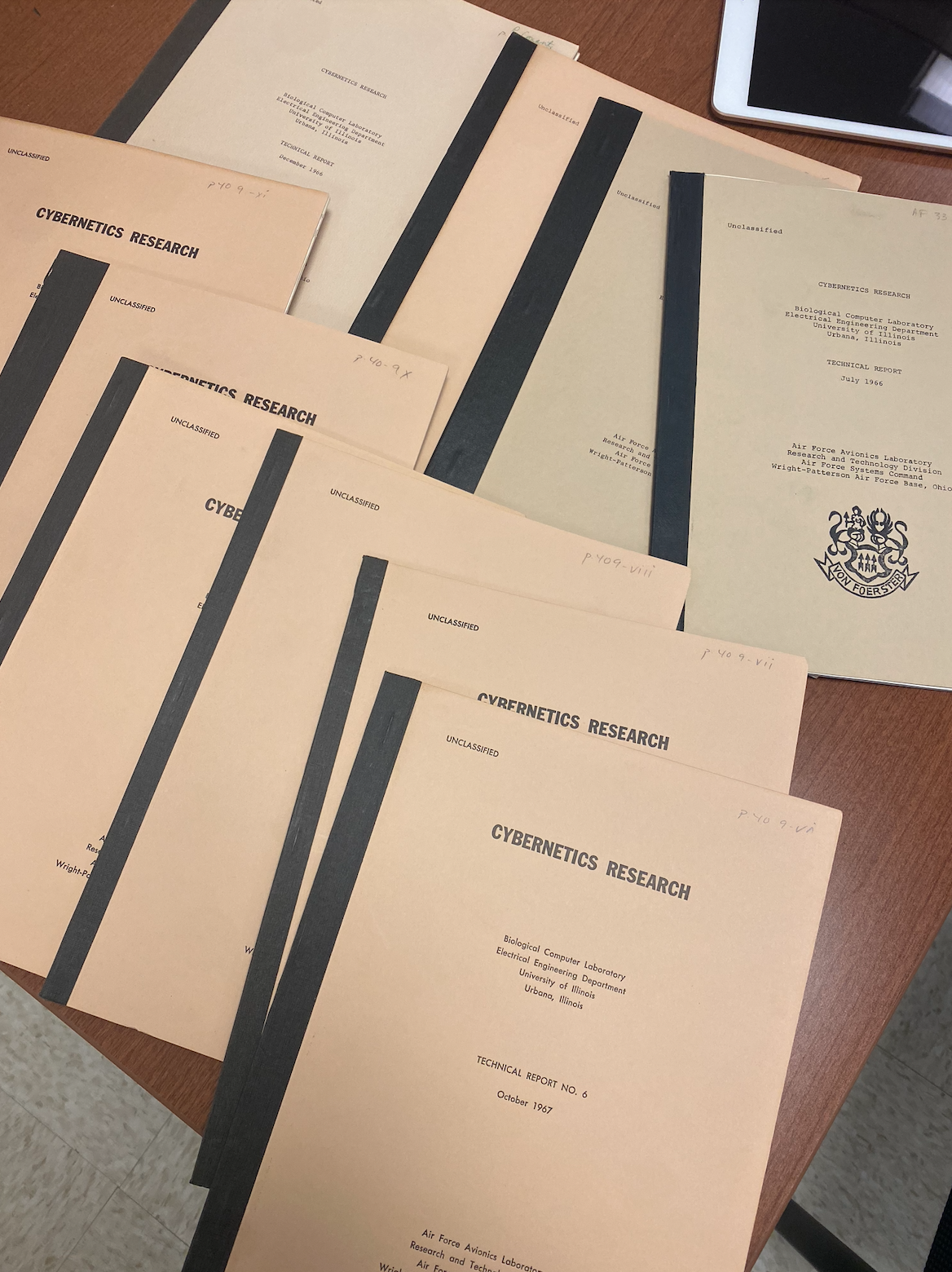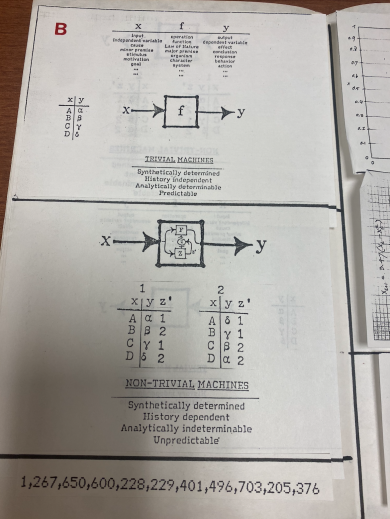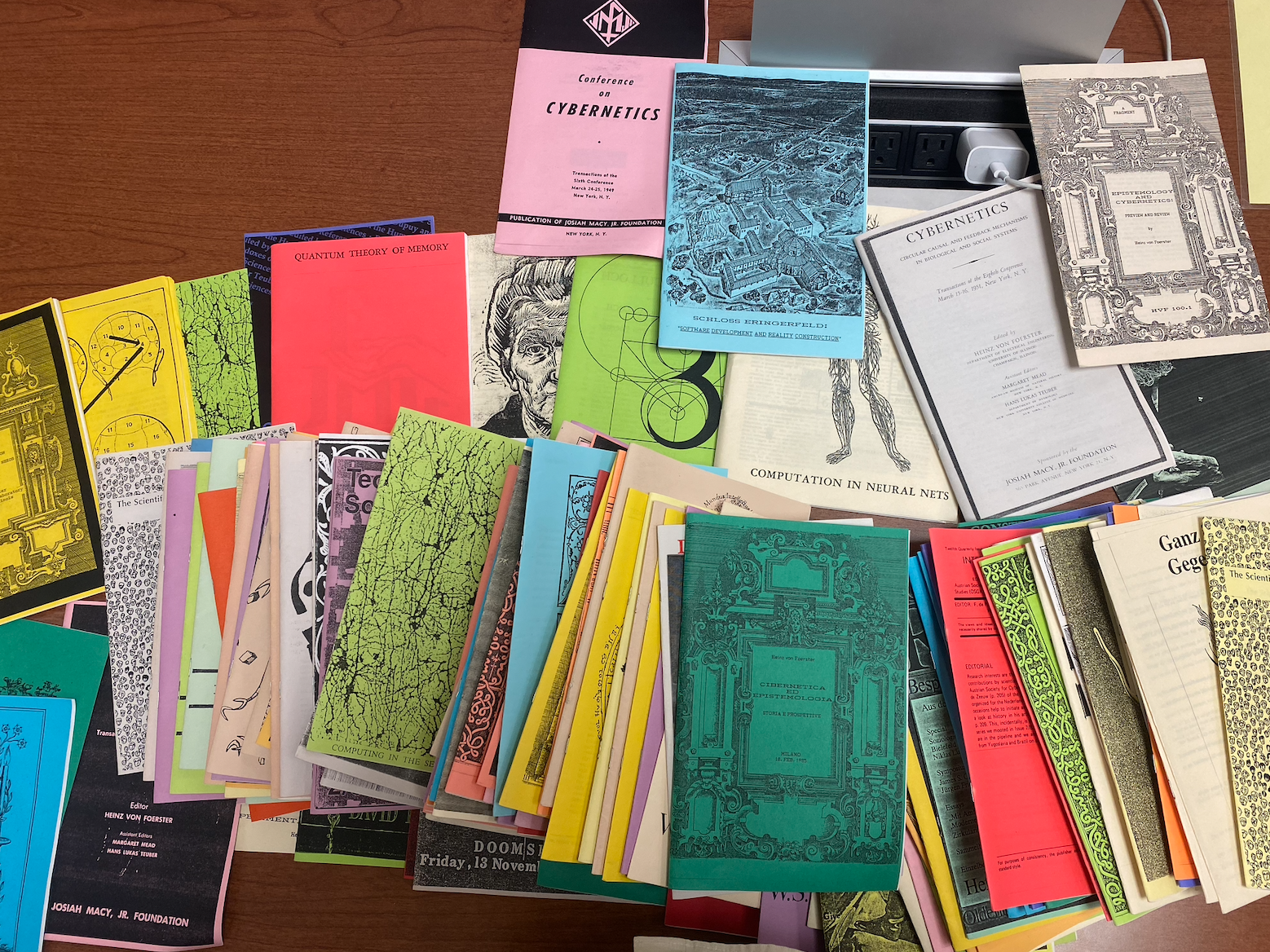Grad Profile: Won Jeon
 Won Jeon is a PhD candidate in History of Consciousness at UC Santa Cruz. Her dissertation traces the epistemological insights of first and second-order cybernetics (along the work of Gregory Bateson and Heinz von Foerster) in present conjunctures in social, political, and scientific thought. In a recent interview, we learned more about Jeon’s ongoing writing and archival research. She received a 2022 THI Summer Research Fellowship to support her research project, “Neither Addictive nor Adaptive: A Theory of Learning.” We discussed Jeon’s epistemological approach to cybernetics, her interest in Gregory Bateson’s “ecology of mind” concept, and her experiences doing archival research at the University of Illinois, and in the Special Collections and Archives at our own McHenry Library.
Won Jeon is a PhD candidate in History of Consciousness at UC Santa Cruz. Her dissertation traces the epistemological insights of first and second-order cybernetics (along the work of Gregory Bateson and Heinz von Foerster) in present conjunctures in social, political, and scientific thought. In a recent interview, we learned more about Jeon’s ongoing writing and archival research. She received a 2022 THI Summer Research Fellowship to support her research project, “Neither Addictive nor Adaptive: A Theory of Learning.” We discussed Jeon’s epistemological approach to cybernetics, her interest in Gregory Bateson’s “ecology of mind” concept, and her experiences doing archival research at the University of Illinois, and in the Special Collections and Archives at our own McHenry Library.
Hi Won! We’re excited to learn more about your ongoing research. To begin, could you give us a general synopsis of your dissertation project and, more specifically, the research you have done this summer?
My project is a historical analysis of information, communication, learning, and language in the 20th century. I focus on the field of cybernetics developed around the late 1940s to show how scientists and engineers have grappled with the function of language and communication within developments in systems control and organization, applied across disciplines in engineering, biology, physics, sociology, anthropology, linguistics, psychology, and psychiatry. My archival research began at UCSC’s collection of the Gregory Bateson papers collected since his tenure at Kresge College from 1972-1980. This summer I was able to visit the archives of Bateson’s contemporary and fellow cyberneticist, the electrical engineer Heinz von Foerster and the records of his work group, the Biological Computer Laboratory (BCL), all located in Urbana-Champaign, Illinois. This allowed me access to the historical materials essential to work on an epistemological model of cybernetics situated in the discourse of the history and philosophy of science. Beginning with the inception of the discipline after the Second World War and advancing through decades of reflexive critique of its own premises, I conclude with the remnants of cybernetics in its contemporary applications in capitalistic models of production in the 21st century.
Why do you think Gregory Bateson is such an important figure to study?
Bateson’s contributions to cybernetics represent what is primarily lacking in the widespread applications of cybernetics in the 21st century: a study of the structure of knowledge and epistemology: the ‘how you know of what you think you know.’ In the US, there is a lot of discussion on cyberspace, cybersecurity, cyber-infrastructure, but the term ‘cybernetics’ is not known. But if you substitute ‘cyber’ for computers, then suddenly everyone knows what you are talking about: artificial intelligence, robotics, computer science, systems dynamics modeling, complex adaptive systems capable of simulation and self-organization, deep learning technologies, data analytics and big data, and so on. It’s not news to anyone that huge amounts of data are being collected as common business and commercial practice, whether you are delivering packages to online shoppers or trading stocks or monitoring a federal election or paying your graduate student workers, and that data is analyzed for whatever purposes an institution has.

After playing a key role in the Macy Conferences on Cybernetics from 1946-1953, the meeting place where cybernetics was consolidated into an organized study of feedback and purpose in human and machine systems, Bateson could not stand behind the progressive growth of cybernetics into another branch of utility-focused applied science–its immense wartime contributions aside. He instead became obsessed by the original conceptual question of cybernetics, how a self-corrective system can articulate messages of feedback and use it to adjust their activity to a desired outcome—and how easily this functioning can be rendered pathogenic. But he never did the same thing with this obsession: he modeled the communicative structures of arms races leading to a war, then the speech patterns of schizophrenic individuals and families, then the progression of alcoholism and addiction, then the communication and play of octopuses, dolphins, and otters, then the dynamics of ecological crisis, and so on. He practiced what he preached: a scientific methodology that moved and expanded concepts—a deeper understanding—rather than the surface phenomena. He later distilled this approach in a concept called “ecology of mind,” a model of consciousness structured like an ecosystem in which ideas are subject to functions like evolution, mutation, adaptation, and extinction.
In sum, his “ecology of mind” is a method and model of the so-called ‘interdisciplinary’ turn of the late 20th century, the overall attempt to instantiate a scientific holism during this period in particular, and perhaps one of the reasons why a department called the History of Consciousness was created. On the flip side, I think this commitment to relation, holism, and aesthetics is also why he is remembered as an LSD-popping, Alan Watts-reading, mostly unintelligible theorist of 60s-70s American counter-culture. Overall, Bateson’s ecological model of the mind, as a method of inquiry, structures my engagement with concepts across disciplines of biology, physics, psychoanalysis, and information science in my dissertation.
Would you consider your dissertation to be a biography? Why or why not?
My project is not a biography. Bateson’s key concepts are foundational for developing the questions I want to ask, but he, and other key figures I engage with, are largely evoked for a primary goal of revealing cybernetics as a set of scientific concepts, methods, and logical functions–which is to say a discourse.
My dissertation, on one level, presents cybernetics as a theory of how scientific knowledge is used in individual, institutional, and geopolitical systems, primarily by providing a general theory of regulation. I think Bateson attempted to do this in his own roundabout and often poetic way, but because he had to abandon the cybernetics and information theory of his time to pursue his own lines of research, he lost an analytic grasp of cybernetics as such. On another level, then, my project begins where Bateson left off, inquiring into how epistemology, the “understanding of understanding” as von Foerster would put it, is tacitly stored, rendered inaccessible, and compulsively repeated in human systems: a theory of what is unconscious in science and society. The general proposition here is that science, at its best, helps us to organize our experience, and cybernetics, the science of circular causation and communication, leads us to a reflexive economy of thought that situates experience in historical feedback loops of language and discourse.
The problem, however, is that cybernetic logic has adapted into a capitalistic form of predictive, preemptive, uncertainty-reducing reasoning that we see everywhere today from political decision-making to financial activity.
The problem, however, is that cybernetic logic has adapted into a capitalistic form of predictive, preemptive, uncertainty-reducing reasoning that we see everywhere today from political decision-making to financial activity. We reason by analyzing future probabilities in a process of narrowing down ‘good-enough’ assumptions based not just on past experiences but what we think we need to securitize in the present for a continuously productive and profitable future. By emphasizing instead the biological and psychological aspects of cybernetics, I want to return to a set of age-old questions most elaborated in the past in the domain of the philosophy of science: What would it mean to be able to look at the consequences of an idea? What is the impact of the idea on the phenomenon, and vice versa, particularly in this contemporary moment of ‘cybernetic capitalism’ whereby the scientific and technical spheres are inextricably homogenized in structuring modes of production and subjectification, regimes of digital economy, immaterial workers, and the rule of algorithms in social relations?
In your research on Bateson’s intellectual contributions to various fields, you pay special attention to how Bateson and his interlocutors perceived addiction. Can you tell us more about what Bateson thought about addiction, and how your study departs from his understanding of addiction?
Please bear with me as I answer this question in a roundabout way. Basically, cybernetics consists of two elements, the regulator and the system being regulated, and there is a circular causal relation between the two. What connects the thermostat on the wall and the heater, the transference between the analyst and the analysand, the operator of the weapon and the weapon, or the manager of the firm and the firm, is the problem of recursion and self-referentiality, the problem of when the solution to the problem is already determined by the same problem. This is inherent in the circular causal relation, and it is a very general description that can be used for biological, psychological, and social systems. What is key here is understanding that the circular causal process between the regulator and the system being regulated involves certain common functions—perception, selection, learning, adaptation—and these functions are common in any scale, from the individual to the social system to the networks of international relations. They operate within the human body and they are built into the institutions, machinery, and technologies we produce.

Bateson’s understanding of addiction, developed in tandem with his double bind research group treating traumatized veterans in the 1950s, emerges strictly from this cybernetic view of common functions in the regulation of a system. Addiction, at any scale, is observable when these functions of regulation developed in order to survive in a present condition actively preclude an ability to create, learn, and change. Highly efficient forms of adaptation—not as individual acts but entrenched habits of action—are oftentimes resistant to levels of learning that constitutes material change. Bateson’s theory of addiction, adaptation, and learning thus leads to a paradox, and it can only be modeled as such: you become addicted to the very adaptive measures you take to not be addicted, all to grant yourself flexibility in the mental and material conditions that demand adaptation to survive. The snake returns to bite its own tail.
The thing about paradoxes is that in any attempt to solve it you only end up operating within its logic. You become entrenched in it. So my project is an active attempt to not solve the paradox, to not defeat the addiction, but see what is submerged in it, what is at the deep end of it. Bateson once said that you can only leave a double-bind by way of another double-bind, so I depart from his framework of addiction by taking the Freudo-Lacanian model of the psyche much more seriously than he did. Attempting an analysis of cybernetics is itself a search for meaning, the speech of what is repressed, which is a paradox in and of itself. This is what I need to figure out how to articulate going forward. Altogether, though, this research focuses on language, both in psychoanalysis as the symbolic function of the unconscious and in cybernetics as a theory of signals, noise, and messages, and how it makes apparent what von Foerster calls an “epistemological blind spot,” the recursive tangle in which you perceive that you do not know how you perceive.
For part of your research, you used the Gregory Bateson Papers that are housed in the Special Collections and Archives in the McHenry Library at UC Santa Cruz. What has it been like to read through these papers? If you had to pick, what is the most interesting document (or two) that you have found and why do you find it so interesting?

I was riveted to find that in 1967, Bateson was invited to the International Congress on the Dialectics of Liberation Conference hosted by the Institute of Phenomenological Studies in London, UK. According to the conference description (a three-page document sent to all the invitees), the theme was the goal of liberation from human violence through a systematic elimination of preconceptions at a level of social systems, and the invitation list included the likes of Foucault, Sartre, Levi-Strauss, Marcuse, Laing. Before finalizing his commitment Bateson wrote a four-page letter to the psychiatrist R. D. Laing, who he met during his double-bind research days about a decade ago, alongside a copy of the circulated document covered in line-by-line annotations on why he cannot take the phenomenological position seriously. His letter also is just an indexed bullet-point list of comments elaborating on his annotations. I won’t go into the details of his critique here, but want to highlight that at one point he drops: “Marx and Freud were great men but neither contributed anything that could be used for social doctrine.” Bateson liked to employ a particular brand of neurotic English sass in his personal letters, and I found this letter to be a prime example. What is even more comical though is the fact he still attended and gave a talk that would subsequently develop into one of his more important papers, “Conscious Purpose Versus Nature,” and that a group of feminist laypeople hijacked the stage during the day of his presentation to trash the delightfully unreflexive circle jerk of male intellectual radicalism.
Bateson joined the UC Santa Cruz faculty in 1972, only a few years after its founding in 1965. Were you surprised by anything you may have found about the early days of the campus, or did you learn anything new?
I had prior knowledge that Bateson was appointed as a Regents of California in 1976, but was surprised to see all the letters, records, and appeals he wrote to his Regents warning them of the short and long-term consequences of their decision-making, especially in the UC’s extensive involvement with the funding and manufacturing of nuclear weaponry during and after the Vietnam War. I learned that he wrote an open letter to his fellow Regents in 1980, the year of his death, adapted from his resignation letter to the Special Research Projects committee a year prior. It was published in City on a Hill Press and later featured in the San Francisco Chronicle—with obvious backlash from the administrators and university personnel. In this letter, he writes that nuclear weapons, and the rest of the burgeoning scientific and technological advances developing with and for war, was a “sin of epistemological error.”
The evil in question is an addiction that precludes the system (an institution of education no less!) from learning its own orientation in reality. From the personal to the institutional to the international levels, the evil, “a multi-level addiction combined with death and suffering,” meant that nobody can cease doing what it has previously learned to do. At interlocking levels, from quitting a desired substance to quitting the manufacturing of atomic bombs and burning fossil fuels, we do not know how to get off the binges and even if we did get off, cold turkey, that would be disturbing to whole physiology of the system in question. And we all know, of course, that to continue with the addiction is not less dangerous. So in this letter, Bateson too does the only thing a theorist has learned how to do: he gives a history lesson on the Treaty of Versailles, cites his schizophrenic patient, and reminds his audience about the theology of Thomas Aquinas. It should come as no surprise then that the archives also holds a collection of hate mail from students, faculty, and administrators alike, incensed by Bateson and his shameless pedantic elitism.
On a level of personal enjoyment, it was satisfying to see how he finalized his addiction theory not in a laboratory or clinic, but in the governing power of the university.
Banner Photo: Zine Cover for Larry Peterson and Heinz von Foerster’s 1971 paper “The Cybernetics of Taxation: The Optimization of Economic Participation.”
